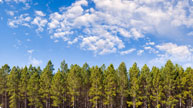Sustainability
 That wood is good is virtually a foregone conclusion. For thousands of years, wood has been used as a building material and the fact is wood has huge environmental benefits over other building products. It is completely biodegradable, works as an effective insulator, and is 100 percent renewable. As Pritzker Prize winner Glenn Murcutt, one of Australia’s most notable architects and May ’09 AIA Gold Medalist put it, “One of the few sustainable materials is timber (wood). Steel and aluminum require more energy to produce. They should be used sparingly.”
That wood is good is virtually a foregone conclusion. For thousands of years, wood has been used as a building material and the fact is wood has huge environmental benefits over other building products. It is completely biodegradable, works as an effective insulator, and is 100 percent renewable. As Pritzker Prize winner Glenn Murcutt, one of Australia’s most notable architects and May ’09 AIA Gold Medalist put it, “One of the few sustainable materials is timber (wood). Steel and aluminum require more energy to produce. They should be used sparingly.”
To ensure sustainability, wood products from certified forests should be specified which, admittedly, is often a difficult and confusing task. According to MetaFore, (a non-profit organization specializing in working with businesses to implement innovations relating to evaluating, selecting and manufacturing environmentally preferable wood and paper products) there are several certification systems relevant to the North American marketplace:
- The American Tree Farm System (ATFS) covers small, private, non-industrial landowners, typically family forest landowners. ATFS certifies contiguous parcels from 10 to 20,000 acres and was endorsed by PEFC in August of 2008.
- The Programme for the Endorsement of Forest Certification Schemes (PEFC) is a mutual recognition framework for national forest certification standards.
- The Canadian Standards Association (CSA) is a national standard for sustainable forest management and tracking and labeling certified material. It covers operations in Canada. It is endorsed by PEFC.
- The Forest Stewardship Council (FSC) is an international system covering forest management practices and the tracking and labeling of certified products and paper products with recycled content.
- The Sustainable Forestry Initiative® Program (SFI) is a sustainable forest management standard targeting large industrial operations in Canada and the United States. It is endorsed by PEFC.
These certification programs all promote principles, criteria and objectives that are viewed as the basis of sustainable forest management around the world. While certification is intended to enhance forest management practices around the world, most certified forestry operations are located in Canada and the US. The best way to improve forest management globally is to focus on the global forests that are not certified at all.
